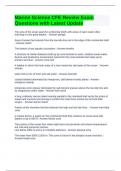-
1. Exam (elaborations) - 01.06 module one exam questions and answers
-
2. Exam (elaborations) - Aice marine science a level exam questions with correct answers
-
3. Exam (elaborations) - Aice marine science as level exam review paper 1, 2 questions with correct answers
-
4. Exam (elaborations) - Aice marine science exam ch 3 questions with verified answers
-
5. Exam (elaborations) - Aice marine science exam review questions with correct answers
-
6. Exam (elaborations) - Aice marine science exam study guide (part 1) questions and answers
-
7. Exam (elaborations) - Aice marine science final exam questions with correct answers
-
8. Exam (elaborations) - Aice marine science final test review (units 1-7) exam questions with latest update
-
9. Exam (elaborations) - Aice marine test - topic 2 exam questions with correct answers
-
10. Exam (elaborations) - Intro to marine science exam #2 questions with correct answers
-
11. Exam (elaborations) - Intro to marine science final exam questions with correct answers
-
12. Exam (elaborations) - Introduction to marine science exam 1 review outline questions and answers
-
13. Exam (elaborations) - Marine science 2 semester 1 course review exam questions and answers
-
14. Exam (elaborations) - Marine science 101 final exam questions with complete solutions
-
15. Exam (elaborations) - Marine science 111 lab exam questions with correct answers
-
16. Exam (elaborations) - Marine science a final exam and answers
-
17. Exam (elaborations) - Marine science cfe review exam questions with latest update
-
18. Exam (elaborations) - Marine science chapter 6 exam questions and answers
-
19. Exam (elaborations) - Marine science exam #4 questions with latest update
-
20. Exam (elaborations) - Marine science exam review questions with complete solutions
-
21. Exam (elaborations) - Marine science exam review exam questions with latest update
-
22. Exam (elaborations) - Marine science exam questions with verified answers
-
23. Exam (elaborations) - Marine science exam questions and answers
-
24. Exam (elaborations) - Marine science exam module six exam flvs questions and answers
-
25. Exam (elaborations) - Marine science exam 4 (11,13,14,15) questions and answers
-
26. Exam (elaborations) - Marine science exam 3 questions with complete solutions
-
27. Exam (elaborations) - Marine science exam 3 questions and answers latest update
-
28. Exam (elaborations) - Marine science exam 1 study guide questions with verified answers
-
29. Exam (elaborations) - Marine science exam 1 questions and answers
-
30. Exam (elaborations) - Marine science exam study guide questions and answers
-
31. Exam (elaborations) - Marine science final exam questions with latest update guaranteed pass
-
32. Exam (elaborations) - Marine science final exam questions with latest update
-
33. Exam (elaborations) - Module 4 exam | marine science questions with verified answers
-
34. Exam (elaborations) - Module 2 exam marine science exam questions with verified answers
-
35. Exam (elaborations) - Marine science semester 2 exam study guide questions with correct answers
-
36. Exam (elaborations) - Marine science semester 1 exam questions with latest update
-
37. Exam (elaborations) - Marine science segment 1 exam questions with complete solutions
-
38. Exam (elaborations) - Marine science second semester exam review questions and answers
-
39. Exam (elaborations) - Marine science questions exam test 1 questions and answers
-
40. Exam (elaborations) - Marine science module 6 exam questions and answers
-
41. Exam (elaborations) - Marine science module 3 exam questions and answers
-
42. Exam (elaborations) - Marine science mid-term exam questions with latest update
-
43. Exam (elaborations) - Marine science ii final exam questions with latest update
-
44. Exam (elaborations) - Marine science honors final exam review questions with correct answers
-
45. Exam (elaborations) - Marine science final exam review questions with latest update
-
46. Exam (elaborations) - Marine science final exam review questions and answers latest update
-
47. Exam (elaborations) - Marine science final exam questions with verified answers
-
48. Exam (elaborations) - Marine science final exam questions with verified answers
-
Show more




